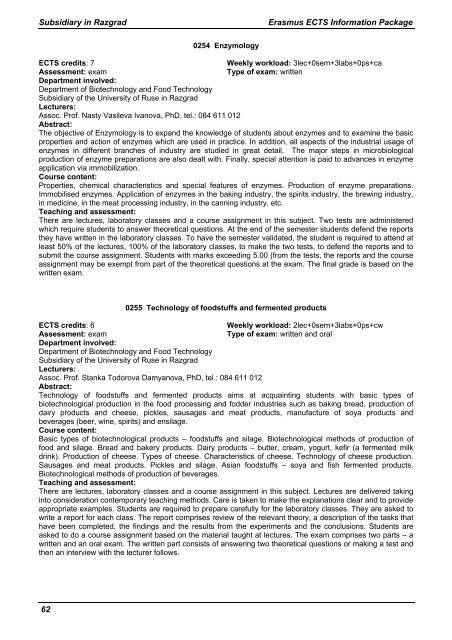Subsidiary in Razgrad
Subsidiary in Razgrad
Subsidiary in Razgrad
Create successful ePaper yourself
Turn your PDF publications into a flip-book with our unique Google optimized e-Paper software.
<strong>Subsidiary</strong> <strong>in</strong> <strong>Razgrad</strong><br />
Erasmus ECTS Information Package<br />
0254 Enzymology<br />
ECTS credits: 7<br />
Weekly workload: 3lec+0sem+3labs+0ps+ca<br />
Assessment: exam<br />
Type of exam: written<br />
Department <strong>in</strong>volved:<br />
Department of Biotechnology and Food Technology<br />
<strong>Subsidiary</strong> of the University of Ruse <strong>in</strong> <strong>Razgrad</strong><br />
Lecturers:<br />
Assoc. Prof. Nasty Vasileva Ivanova, PhD, tel.: 084 611 012<br />
Abstract:<br />
The objective of Enzymology is to expand the knowledge of students about enzymes and to exam<strong>in</strong>e the basic<br />
properties and action of enzymes which are used <strong>in</strong> practice. In addition, all aspects of the <strong>in</strong>dustrial usage of<br />
enzymes <strong>in</strong> different branches of <strong>in</strong>dustry are studied <strong>in</strong> great detail. The major steps <strong>in</strong> microbiological<br />
production of enzyme preparations are also dealt with. F<strong>in</strong>ally, special attention is paid to advances <strong>in</strong> enzyme<br />
application via immobilization.<br />
Course content:<br />
Properties, chemical characteristics and special features of enzymes. Production of enzyme preparations.<br />
Immobilised enzymes. Application of enzymes <strong>in</strong> the bak<strong>in</strong>g <strong>in</strong>dustry, the spirits <strong>in</strong>dustry, the brew<strong>in</strong>g <strong>in</strong>dustry,<br />
<strong>in</strong> medic<strong>in</strong>e, <strong>in</strong> the meat process<strong>in</strong>g <strong>in</strong>dustry, <strong>in</strong> the cann<strong>in</strong>g <strong>in</strong>dustry, etc.<br />
Teach<strong>in</strong>g and assessment:<br />
There are lectures, laboratory classes and a course assignment <strong>in</strong> this subject. Two tests are adm<strong>in</strong>istered<br />
which require students to answer theoretical questions. At the end of the semester students defend the reports<br />
they have written <strong>in</strong> the laboratory classes. To have the semester validated, the student is required to attend at<br />
least 50% of the lectures, 100% of the laboratory classes, to make the two tests, to defend the reports and to<br />
submit the course assignment. Students with marks exceed<strong>in</strong>g 5.00 (from the tests, the reports and the course<br />
assignment may be exempt from part of the theoretical questions at the exam. The f<strong>in</strong>al grade is based on the<br />
written exam.<br />
0255 Technology of foodstuffs and fermented products<br />
ECTS credits: 6<br />
Weekly workload: 2lec+0sem+3labs+0ps+cw<br />
Assessment: exam<br />
Type of exam: written and oral<br />
Department <strong>in</strong>volved:<br />
Department of Biotechnology and Food Technology<br />
<strong>Subsidiary</strong> of the University of Ruse <strong>in</strong> <strong>Razgrad</strong><br />
Lecturers:<br />
Assoc. Prof. Stanka Todorova Damyanova, PhD, tel.: 084 611 012<br />
Abstract:<br />
Technology of foodstuffs and fermented products aims at acqua<strong>in</strong>t<strong>in</strong>g students with basic types of<br />
biotechnological production <strong>in</strong> the food process<strong>in</strong>g and fodder <strong>in</strong>dustries such as bak<strong>in</strong>g bread, production of<br />
dairy products and cheese, pickles, sausages and meat products, manufacture of soya products and<br />
beverages (beer, w<strong>in</strong>e, spirits) and ensilage.<br />
Course content:<br />
Basic types of biotechnological products – foodstuffs and silage. Biotechnological methods of production of<br />
food and silage. Bread and bakery products. Dairy products – butter, cream, yogurt, kefir (a fermented milk<br />
dr<strong>in</strong>k). Production of cheese. Types of cheese. Characteristics of cheese. Technology of cheese production.<br />
Sausages and meat products. Pickles and silage. Asian foodstuffs – soya and fish fermented products.<br />
Biotechnological methods of production of beverages.<br />
Teach<strong>in</strong>g and assessment:<br />
There are lectures, laboratory classes and a course assignment <strong>in</strong> this subject. Lectures are delivered tak<strong>in</strong>g<br />
<strong>in</strong>to consideration contemporary teach<strong>in</strong>g methods. Care is taken to make the explanations clear and to provide<br />
appropriate examples. Students are required to prepare carefully for the laboratory classes. They are asked to<br />
write a report for each class. The report comprises review of the relevant theory, a description of the tasks that<br />
have been completed, the f<strong>in</strong>d<strong>in</strong>gs and the results from the experiments and the conclusions. Students are<br />
asked to do a course assignment based on the material taught at lectures. The exam comprises two parts – a<br />
written and an oral exam. The written part consists of answer<strong>in</strong>g two theoretical questions or mak<strong>in</strong>g a test and<br />
then an <strong>in</strong>terview with the lecturer follows.<br />
62
















